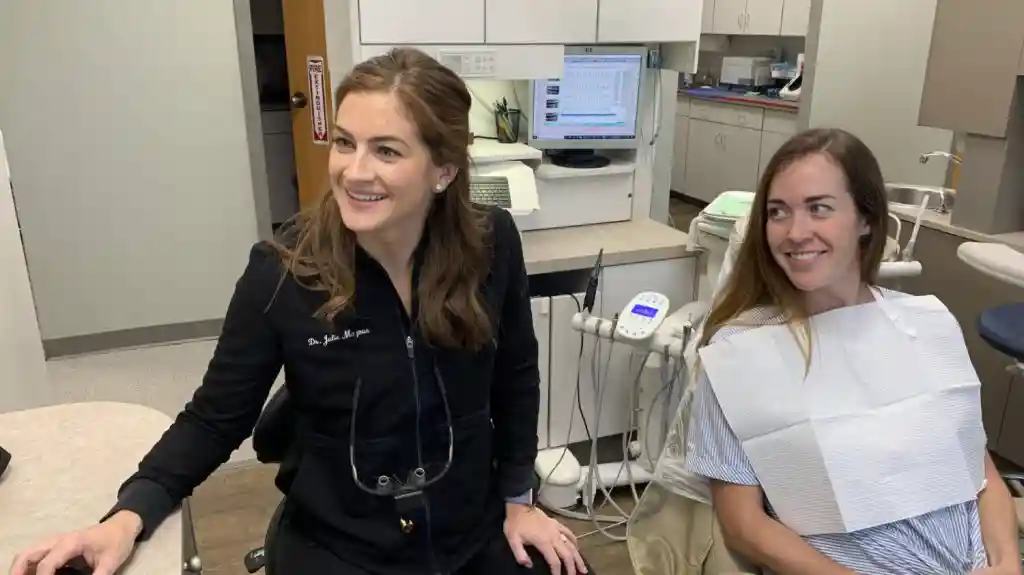Health & Fitness
Beyond Aesthetics: Dentists in North York Tackle Receding Gums for Oral Health

Nestled within the diverse tapestry of Toronto, North York stands out as a vibrant community with its own distinct character and needs, including those related to oral health. As part of the Greater Toronto Area, North York boasts a rich array of dental practices catering to its residents’ diverse needs. Among the myriad oral health concerns addressed by a North York dentist, one prevalent issue is the management of receding gums. While often overlooked, receding gums can have significant implications for oral health if left untreated. This article discusses how dentists in North York are taking proactive steps to tackle receding gums, prioritizing the aesthetics and the overall oral well-being of their patients.
Understanding Receding Gums: Causes and Consequences
This occurs when the gum tissue surrounding teeth recedes, exposing the tooth roots. Several factors, such as gum disease, vigorous brushing, genetics, hormonal fluctuations, and smoking, contribute to this condition. If left untreated, receding gums cause tooth sensitivity, higher susceptibility to tooth decay, and eventual loss. Aware of the seriousness of this problem, dental professionals are implementing proactive approaches to combat receding gums and minimize their impact on oral health.
The Role of Dentists in North York
In North York, dentists detect, prevent, and treat receding gums through comprehensive oral examinations and advanced diagnostic tools. They meticulously assess gum recession levels and identify underlying factors contributing to the condition. With this knowledge, they craft tailored treatment plans, utilizing techniques like scaling and root planing, gum grafting, and lifestyle modifications to address each patient’s unique needs.
Patient education is central to their approach, as they let patients know the best ways to maintain optimal oral health. By integrating advanced technology, personalized care, and education, dentists in North York are dedicated to delivering excellence in oral healthcare, ensuring their patients’ smiles remain healthy and resilient for years to come.
Innovative Treatments and Techniques
Advancements in dental technology have revolutionized the management of receding gums, offering patients in North York access to innovative treatments and techniques. One such technique is soft tissue grafting, in which healthy gum tissue is transplanted to areas of recession to restore gum volume and coverage.
Laser therapy has also emerged as a minimally invasive option for addressing gum recession, promoting tissue regeneration, and enhancing healing outcomes. By leveraging these cutting-edge modalities, dentists in North York are able to deliver optimal results while prioritizing patient comfort and convenience.
Preventive Measures: Promoting Gum Health
In addition to offering treatments for receding gums, dentists strongly emphasize preventive care to promote gum health and minimize the risk of gum recession. Through patient education and counseling, they empower individuals with the knowledge and tools to maintain optimal oral hygiene practices.
This includes proper brushing and flossing techniques, routine dental check-ups, and lifestyle modifications to mitigate risk factors like poor dietary habits and smoking. By fostering a culture of prevention, dentists aim to preserve gum health and prevent the onset of oral conditions such as receding gums.
A North York dentist addresses receding gums, understanding that oral health extends far beyond cosmetic concerns. Employing cutting-edge treatments, preventative strategies, and personalized attention, they aim to safeguard gum health and bolster overall wellness for their patients.
Health & Fitness
Best Gym Lover Bio for Instagram | Perfect Bio for Fitness Enthusiasts

Instagram is more than just a place to post beach pics. It’s where we show off our passions—like fitness. And if you’re someone who loves hitting the gym, well, your Gym Lover Bio for Instagram is pretty much your digital handshake. A good bio can help you connect with like-minded folks and maybe even inspire someone to finally start their fitness journey. (And hey, maybe get a few gym buddies in the process.)
The bio is the first thing people read when they land on your page. And trust me, it’s important. You want something that sums up who you are, what you’re about, and why they should follow your fitness journey. So, let’s dive into how you can craft the perfect Gym Lover Bio for Instagram that speaks to your fitness passion—whether you’re the type to squat a ton or just love feeling the burn during a good cardio session.
Why Does Your Gym Lover Bio for Instagram Matter So Much?
Listen, we’ve all been there: scrolling through Instagram, looking for inspiration or someone to root for. Your Instagram Bio Gym Lover needs to be a solid intro to who you are. It’s like the first line of your favorite playlist—if it’s good, people will stick around to see what else you’ve got.
But really, it’s more than just an intro. Your Bio Gym has the power to:
- Attract the Right Vibes: If you’re into serious lifting, your bio can draw in gym rats who want to join the grind. Or, if you’re all about fun, bodyweight workouts, your bio can bring in folks who like to take it easy (and still get results).
- Get You More Followers: Believe it or not, a well-crafted Gym Lover Bio can boost your chances of getting noticed. A little creativity goes a long way.
- Inspire and Motivate: Sometimes, a good bio can light a fire under someone’s butt. They see your gym journey, and bam—they’re in the gym the next day. It’s like virtual peer pressure, but in the best way possible.
- Show Your Fitness Personality: Are you all about that intense hustle? Or do you prefer low-key, zen-like gym sessions? Your Instagram Bio Gym Lover can showcase whatever side of fitness you live by.
The Magic Behind a Solid Bio Gym
I’ll be real—creating a Gym Bio isn’t rocket science. But it does take a bit of finesse. A good bio doesn’t need to be a novel. It’s more about choosing words that truly reflect your passion for fitness and your personality.
My first attempt at a Gym Lover Bio? Let’s just say I crammed in every motivational quote I could find. “No pain, no gain,” “Push yourself,” “Grind and shine.” You get the vibe. It was… a mess.
Anyway, here’s the kicker: A bio is really just about letting people know what to expect. So, whether you’re into cardio, weight training, or just love the idea of lifting, there’s a way to craft a Gym Lover Bio for Instagram that gets your vibe across.
Different Types of Gym Lover Bio for Instagram
Let’s talk about the kinds of Gym Lover Bio for Instagram that can really stand out. You don’t have to be a motivational speaker or drop the latest fitness jargon—just be yourself. Here’s how I break it down.
1. The Motivational Bio (For All You “Rise and Grind” Types)
If you’re the type who gets up at 5 AM to crush deadlifts or runs a 5K in the rain, this is your jam. I used to try to motivate myself with “Wake up, kick ass, repeat” (definitely not original, but it worked for a while).
Example 1:
- “Stronger every day 💪 Fitness isn’t a phase. It’s a lifestyle. #GymLoverBio #NoExcuses”
Example 2:
- “Grind now, shine later. 🏋️♂️ Consistency is key. #GymBio #FitnessJourney”
2. The Humor Bio (For When You Need a Good Laugh)
If you can laugh at yourself while still flexing in front of the mirror, this one’s for you. My first herb garden died faster than my 2020 sourdough starter—RIP, Gary. Fitness might be serious, but you don’t have to take yourself that seriously.
Example 1:
- “I lift weights so I can lift pizza 🍕🏋️♀️ #GymLoverBio”
Example 2:
- “Squats > drama. Also, pizza > everything. 🍕💪 #GymBio #FitAndFunny”
3. The Simple, No-Nonsense Bio
Some of y’all are straight to the point. No fluff. No quotes. Just the cold hard facts. And hey, I respect that.
Example 1:
- “Gym lover. Fitness addict. Here for the gains. 💪 #BioGym”
Example 2:
- “Lifting and living my best life. 🏋️♂️ #GymLoverBio”
4. The Progress & Goals Bio (For All the Achievers Out There)
Maybe you’re working on something big. Maybe you’ve already hit that major milestone and you’re here to share it. If that’s you, your Instagram Gym Bio Lover should be your chance to showcase it.
Example 1:
- “Lost 30 lbs, found my confidence. 💪 #GymLoverBio #ProgressNotPerfection”
Example 2:
- “Deadlift goal: 300 lbs 🏋️♀️ You in? #BioGym”
5. The Personal Touch Bio (For When You’re Extra)
This one’s for the folks who want to go deep. Who aren’t just about the gym, but about the journey—the physical, mental, and emotional grind. And trust me, this one works.
Example 1:
- “Fitness saved my mind. Lifting keeps me grounded. 🧘♂️💪 #InstagramBioGymLover”
Example 2:
- “Progress is personal. Fitness is forever. 💥 #GymBio”
A Few Tips for the Perfect Gym Lover Bio for Instagram
Alright, now that we’ve got the basics covered, let’s talk tips. Because you could slap together a basic Gym Lover Bio for Instagram, but why not make it memorable?
1. Keep It Real
I mean this one. Be honest. When I first started, I didn’t have any fancy PRs to brag about, so I kept it humble. “Newbie in the gym, but excited to learn,” was the vibe. It was awkward, but it worked.
Example:
- “New to the gym, but the hustle is real. 🏋️♂️ #GymLoverBio”
2. Use Emojis (But Don’t Overdo It)
I love emojis. They break up the text and add personality. But—don’t go overboard. A few strategically placed emojis can make your Gym Bio pop without looking like you’re trying too hard.
Example:
- “Lifting, running, living 💪 #GymBio”
3. Update It Often
I used to forget about my bio for months. Bad move. Keep it fresh and aligned with your current goals. If you’ve hit a new milestone or changed up your routine, update that bad boy. People notice.
Example:
- “PR on deadlifts 💥 Progressing every day. #GymLoverBio”
4. Add a Call to Action (CTA)
The best way to make your bio work for you? Add a CTA. A subtle “DM me for workout tips” or “Follow for more fitness updates” can go a long way in building your following.
Example:
- “Follow my fitness journey 🏋️♀️ #GymBio #GymLoverBio”
Final Thoughts: Your Gym Lover Bio is Your Digital First Impression
Creating the perfect Gym Lover Bio for Instagram isn’t something you can rush. It’s about reflecting your fitness personality and your journey in a way that resonates with others. And hey, if you can make someone laugh or motivate them along the way? Even better.
So go ahead—craft that bio. Whether you’re all about lifting or love the quiet zen of stretching, make it yours. Trust me, you’ll start attracting the right crowd in no time.
Health & Fitness
Tobi Bamtefa Height and Weight & Weight Loss Journey Explained

Okay, let’s get something straight first: Tobi Bamtefa is more than just an influencer. He’s got that killer combo of charm, fitness tips, and a personality that makes you want to re-evaluate your entire existence—while scrolling through his Instagram, of course. So, what about the whole “height and weight” thing, though? If you’ve found yourself Googling “how tall is Tobi Bamtefa?” or wondering what’s up with his weight loss journey, I’ve got you covered.
Let’s dive into the numbers (and the sweat) of this transformation, and trust me, it’s more inspiring than a motivational quote on Pinterest.
Who is Tobi Bamtefa?
Before we get into the nitty-gritty of Tobi Bamtefa’s height and weight, let’s take a quick detour. Tobi Bamtefa is one of those guys who casually shares his life on Instagram and YouTube, but somehow you end up watching his whole fitness transformation like it’s the latest Netflix docuseries.
He’s not just a fitness guy—he’s got the kind of energy that draws you in. Think charisma meets hustle. But what’s more impressive than his personality? His weight loss journey, of course. He has totally reshaped not only his body but his lifestyle. And guess what? His transformation has become the ultimate inspiration for people who want to get their life back in gear—no matter where they’re starting.
The Numbers Game: Tobi Bamtefa Height and Weight
Alright, so you didn’t land here for me to recap Tobi’s social media career. You’re here for the numbers. You know, the “how tall is Tobi Bamtefa” and “what is his weight” stuff. Here we go:
How Tall Is Tobi Bamtefa?
Okay, full confession: I thought Tobi was taller than he actually is, but he’s a solid 6 feet 2 inches (188 cm). Tall enough to be that guy who always reaches the top shelf without looking like he’s showing off. And while we’re here, I guess it’s safe to say that his height definitely helps him stand out in a crowd—whether it’s at a fitness event or just strolling through his local farmer’s market. It’s like, you know he’s in the room, you feel?
What’s Tobi Bamtefa’s Weight?
Ah, the weight. As with many of us, this one fluctuates depending on the time of year (and how many burritos he ate at Taco Tuesday). As of now, Tobi weighs around 210 pounds (95 kg). But let me clarify: this isn’t some “I just stepped on a scale” kind of number. This weight represents the hard work he put in during his weight loss journey, combining strength training with consistent diet changes. It’s the kind of transformation you can almost feel in your bones—literally.
Tobi Bamtefa’s Weight Loss Journey: Let’s Break It Down
Fast forward past three failed attempts at fad diets (I mean, we’ve all been there, right?), and now here we are with Tobi’s legit weight loss transformation. From a guy who wasn’t always as comfortable with his body to someone who now uses his journey to inspire literally thousands—that’s a pretty huge deal.
Where It All Started
Alright, picture this: It’s 2018, and Tobi’s taking a hard look in the mirror. Let’s just say, the man wasn’t exactly happy with what he saw. He wasn’t feeling his best—both mentally and physically. He was juggling work, personal life, and a whole bunch of stress, and that had definitely taken a toll on his health.
But you know what? He turned that frustration into fuel. No more sitting around and wishing for change. He got up and did something about it. After all, it’s one thing to complain about the way you look, but it’s something else entirely to decide to do something about it.
Diet Changes (And What Tobi Actually Ate)
Now, I’m not here to throw shade at that pizza you ate last weekend—hey, we all need our cheat meals. But for Tobi, the focus was on cleaner eating. His approach? Start with small changes, and then get serious.
He focused on whole foods. You know, the kind of food you’re supposed to eat because your body’s like, “Yes, thank you for that kale.” The guy went full-on meal prep mode, getting all kinds of organized. Trust me, this was no “grab-and-go” snack routine. We’re talking about planning out lean proteins, fiber-rich veggies, and complex carbs. No more random fast food runs (even though I can’t blame him for missing that late-night burger from Pete’s Diner down the street).
- Protein-packed meals (Chicken, turkey, eggs)
- Veggies galore (Spinach, broccoli, sweet potatoes)
- Healthy fats (Avocados, nuts)
He even swapped out the sugary snacks for healthier options. But hey, he’s human, right? There were still days when Tobi had to pass on the chocolate cake. The man has discipline, but we’re not perfect, are we?
The Workout: From Couch to Killer Abs
Okay, let’s talk exercise—because let’s face it, we all want to know how he went from zero to beast mode. Tobi got into strength training and cardio, combining both to lose fat and build muscle. Simple, right? Yeah, no. It wasn’t easy. But hey, here’s the kicker: It worked.
I remember reading that Tobi’s favorite routine consisted of:
- Strength Training: Deadlifts, squats, and bench presses.
- Cardio: Running, cycling, HIIT workouts (the kind of stuff that leaves you questioning your life choices while also feeling like a total champ afterward).
Oh, and don’t get me started on those first few weeks in the gym. He definitely looked like a deer caught in the headlights. I mean, who hasn’t been there? You walk into the gym, see a bunch of people who look like they bench-press refrigerators, and suddenly, you’re convinced you’ve made a huge mistake. But Tobi? He pushed through. And now? Well, let’s just say he’s the one inspiring everyone else.
Mindset: More Than Just Physical Change
Now, let’s not forget the mind games. You can’t just be like, “I’m gonna lose weight” and expect it to happen overnight. Tobi learned that the hard way. There were times when he felt frustrated, like he wasn’t seeing enough progress fast enough. But instead of quitting, he turned that frustration into fuel. If there’s one thing I’ve learned from him, it’s that weight loss isn’t just physical—it’s mental too.
The Ripple Effect of Tobi Bamtefa’s Transformation
As Tobi’s body transformed, so did his entire lifestyle. You can see it in his confidence, his energy, and the way he handles his social media presence.
And the best part? He’s not just inspiring fitness junkies; he’s motivating people who are actually trying to get their lives together. I’ve seen comments from his followers saying how his journey pushed them to get off the couch, too. I mean, who wouldn’t feel inspired by someone who went from struggling to owning it in front of thousands?
So, What’s Changed for Tobi?
- Confidence through the roof.
- Energy levels that rival a caffeinated squirrel.
- More career opportunities—the man’s got endorsements rolling in because people see him as authentic. That’s the real takeaway, y’all.
His weight loss didn’t just change his body. It gave him a new purpose. And let’s be real: it probably helped with his modeling career, too. I mean, the guy could probably sell me anything at this point.
Wrapping It Up: Tobi Bamtefa’s Impact and Legacy
Here’s the kicker: Tobi Bamtefa’s journey is about more than just weight loss. It’s a story about transformation—physically, mentally, and emotionally. His height and weight numbers? They’re part of the story, but not the whole story.
Fast forward a few years, and Tobi is now living proof that dedication, consistency, and a little bit of hard work go a long way. His transformation is proof that the process works if you’re committed. And guess what? You don’t have to be a social media influencer to achieve it.
Health & Fitness
Isabel May’s Love Life: Relationship Status & Dating History

Isabel May. The name’s got a nice ring to it, doesn’t it? If you’ve seen 1883 or Alexa & Katie, then you already know she’s more than just a pretty face. But, there’s one thing fans seem to be dying to know: what about Isabel May’s love life? The rumors. The speculation. The mystery of whether she has a boyfriend.
Isabel’s an actress—sure. But she’s also a person who, like the rest of us, has a life outside the cameras. Let’s break it down, shall we? Buckle up, folks. We’re diving into Isabel May’s dating history, relationship status, and a whole lot of unanswered questions. You ready?
How Isabel May’s Stardom Started
First off, I’d be lying if I didn’t admit that I once Googled “Isabel May relationship” just to see if anything juicy would pop up. (Nothing did, by the way—so if you’re looking for scandalous tidbits, you’re in the wrong place.) But before we get to that juicy stuff, let’s rewind a little. Isabel’s career didn’t just happen overnight.
Born on November 21, 2000 (yes, that makes her a Scorpio, so we already know she’s got a little bit of edge), Isabel started acting when she was still just a teen. Her big break? The Netflix show Alexa & Katie, where she played Alexa. That role really put her on the map and helped her land bigger projects, like 1883, where she played the role of Elsa Dutton, which—if you ask me—was a perfect fit.
Now, despite all the buzz around her career, Isabel has managed to keep one thing pretty quiet—her love life. Maybe that’s a good thing, though, considering how quickly the internet gets bored and starts making stuff up.
Is Isabel May Dating Anyone? The Big Question
I’m going to level with you: I tried to find the answer to the big question: “Who is Isabel May dating?” Spoiler alert: no luck. Nada. Zilch. Zero.
Isabel’s relationship status? She’s been tight-lipped about it, and I’m not mad about it. In fact, I kind of respect it. Not every celebrity wants to air their dirty laundry, and considering the drama that comes with living in the public eye, I don’t blame her one bit.
The last time someone got super personal about their relationship online, well… let’s just say it didn’t end well. Remember the whole “Lindsey Lohan dating the world” debacle? Yeah, pass. Anyway, I’m guessing Isabel is playing it smart. No messy Instagram posts, no relationship “announcements,” just living her life and doing her job.
So, back to the original question: Is Isabel May in a relationship? There’s no public confirmation. Maybe she’s single, maybe she’s not—your guess is as good as mine.
Isabel May’s Dating History: What We Know (or Don’t)
Okay, let’s play detective for a sec. We know Isabel’s career has been in full swing for a while, but there’s barely any info on who she’s dated. And that’s the point. It’s all shrouded in mystery.
Some fans on Reddit (God bless them) have speculated about past boyfriends, but, let’s be real—nobody knows anything. No public relationships. No “Instagram official” moments. It’s a ghost town. Cue crickets. Is this intentional? Probably. But who knows? Maybe she’s just had a lot of “let’s keep it low-key” moments.
Here’s the kicker: I think we’re all a little obsessed with this because we know Isabel May’s love life has got to be way more interesting than we’re seeing. The fact that she keeps it private? That just adds fuel to the fire.
Isabel May’s Boyfriend: Or Maybe She Doesn’t Have One?
There’s a good chance Isabel May has never even been publicly linked to anyone—no exes, no “mysterious” boyfriends showing up in the background of her social media posts. Nothing. Why? Well, maybe she’s just… focused on herself. Y’know, that whole “I don’t need a boyfriend to be happy” vibe? I mean, I get it. I once dated a guy who wore socks with sandals—red flag. We broke up after two weeks.
What I’m trying to say is: a girl can be focused on her career and live her life without needing to make everything public. My first herb garden died faster than my 2020 sourdough starter—RIP, Gary—but Isabel’s doing things her own way. She’s not out there turning her romantic life into clickbait. So, maybe her dating life is just… her life. And that’s totally cool.
The Real Question: What Does Isabel May Look for in a Partner?
Since we’re all basically playing armchair psychologist now, let’s dig deeper. Isabel’s relationship preferences? Well, that’s anyone’s guess. But based on her public persona, I imagine she’s not the type to settle for someone just because they’re “hot” or “famous.”
One thing I’ve noticed is that Isabel has a quiet confidence about her. She doesn’t seem like she’s into the whole “look at me, look at me!” fame game. So maybe her ideal partner is someone who understands that—someone who’s grounded, self-sufficient, and doesn’t mind staying out of the spotlight.
But, hey, who am I to say? I’ve been wrong more times than I can count. (Hello, college chemistry—shudder.)
Fast Forward to the Future: Will Isabel May Ever Reveal Her Partner?
I’m not going to hold my breath waiting for Isabel to drop a big reveal about her boyfriend or partner. Some people just aren’t into that kind of transparency. And that’s alright! After all, look at Taylor Swift. She writes about her exes in her songs, and people love that. Isabel May, on the other hand, might just want to skip that whole thing.
For now, we can all just wonder—Who is Isabel May dating? Is she even dating? Will she surprise us all and show up with a new boyfriend on a red carpet? Maybe. Maybe not. But here’s the thing: she doesn’t owe us that info. And I think we should all learn to respect that.
Isabel May’s Dating Life Is Her Own, and That’s Fine
At the end of the day, Isabel May’s relationship life is really none of our business. There’s a lot of speculation, sure. A ton of questions. But that doesn’t mean we have to have all the answers. Personally, I think it’s refreshing when a star decides to keep their private life—well, private.
One thing I do know for sure: Isabel May is wicked talented. Whether she’s in a relationship or not, that girl is going places. Maybe we’ll learn more about her love life as time goes on, or maybe not. Either way, I’m just here for the ride. If you’re still wondering, “Who is Isabel May dating?”—just remember: the real question is, “Who cares?” Let the girl live her best life, and let’s enjoy watching her do her thing on screen.
-

 Travel2 years ago
Travel2 years agoOnboardicafe.com Login Exploring the Delights of Onboardicafe
-

 Entertainment11 months ago
Entertainment11 months agoGyomei – Demon Slayer’s Strongest Hashira Explained
-

 Entertainment12 months ago
Entertainment12 months agoSebastian Solace: The Dark Truth Behind The Mysterious Man
-

 Social Media9 months ago
Social Media9 months ago300+ Mahadev Bio for Instagram in English & Hindi for Shiv Bhakts
-

 Entertainment8 months ago
Entertainment8 months agoGunsmith Part 6: Escape from Tarkov’s Ultimate Guide
-

 Entertainment10 months ago
Entertainment10 months agoTom and Jerry DP – Cute Images for Instagram & WhatsApp
-

 Health & Fitness10 months ago
Health & Fitness10 months agoAlena Yanchevskaya: Age, Biography, Husband and Career
-

 Entertainment11 months ago
Entertainment11 months agoThe One Above All – Marvel’s Strongest Entity Explained












